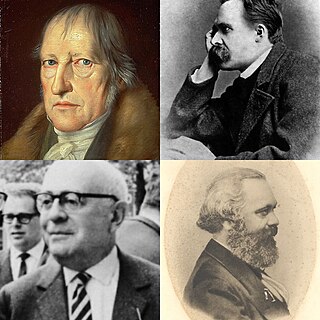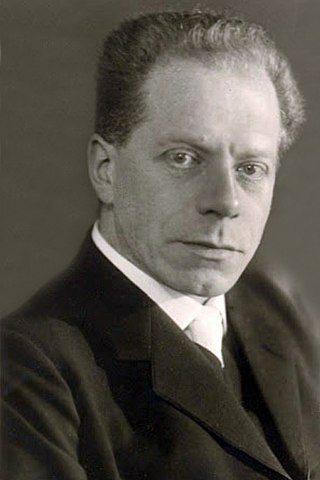Related Research Articles

Jewish philosophy includes all philosophy carried out by Jews, or in relation to the religion of Judaism. Until modern Haskalah and Jewish emancipation, Jewish philosophy was preoccupied with attempts to reconcile coherent new ideas into the tradition of Rabbinic Judaism, thus organizing emergent ideas that are not necessarily Jewish into a uniquely Jewish scholastic framework and world-view. With their acceptance into modern society, Jews with secular educations embraced or developed entirely new philosophies to meet the demands of the world in which they now found themselves.

Harald Høffding was a Danish philosopher and theologian.

German philosophy, meaning philosophy in the German language or philosophy by German people, in its diversity, is fundamental for both the analytic and continental traditions. It covers figures such as Gottfried Wilhelm Leibniz, Immanuel Kant, Georg Wilhelm Friedrich Hegel, Karl Marx, Friedrich Nietzsche, Martin Heidegger, Ludwig Wittgenstein, the Vienna Circle, and the Frankfurt School, who now count among the most famous and studied philosophers of all time. They are central to major philosophical movements such as rationalism, German idealism, Romanticism, dialectical materialism, existentialism, phenomenology, hermeneutics, logical positivism, and critical theory. The Danish philosopher Søren Kierkegaard is often also included in surveys of German philosophy due to his extensive engagement with German thinkers.

Friedrich Wilhelm Joseph Schelling, later von Schelling, was a German philosopher. Standard histories of philosophy make him the midpoint in the development of German idealism, situating him between Johann Gottlieb Fichte, his mentor in his early years, and Georg Wilhelm Friedrich Hegel, his one-time university roommate, early friend, and later rival. Interpreting Schelling's philosophy is regarded as difficult because of its evolving nature.
Continental philosophy is typically a term used as an umbrella term for philosophies prominent in continental Europe. Michael E. Rosen has ventured to identify common themes that typically characterize continental philosophy. These themes proposed by Rosen derive from a broadly Kantian thesis that knowledge, experience, and reality are bound and shaped by conditions best understood through philosophical reflection rather than exclusively empirical inquiry.

Karl Theodor Jaspers was a German-Swiss psychiatrist and philosopher who had a strong influence on modern theology, psychiatry, and philosophy. His 1913 work General Psychopathology influenced many later diagnostic criteria, and argued for a distinction between "primary" and "secondary" delusions.

Leonard Nelson, sometimes spelt Leonhard, was a German mathematician, critical philosopher, and socialist. He was part of the neo-Friesian school of neo-Kantianism and a friend of the mathematician David Hilbert. He devised the Grelling–Nelson paradox in 1908 and the related idea of autological words with Kurt Grelling.
Contemporary philosophy is the present period in the history of Western philosophy beginning at the early 20th century with the increasing professionalization of the discipline and the rise of analytic and continental philosophy.

Paul Jakob Deussen was a German Indologist and professor of philosophy at University of Kiel. Strongly influenced by Arthur Schopenhauer, Deussen was a friend of Friedrich Nietzsche and Swami Vivekananda. In 1911, he founded the Schopenhauer Society (Schopenhauer-Gesellschaft). Professor Deussen was the first editor, in 1912, of the scholarly journal Schopenhauer Yearbook (Schopenhauer-Jahrbuch).
"International Philosophy", commonly referred to as the Philosophers' Football Match, is a Monty Python sketch depicting a football match in the Munich Olympiastadion between philosophers representing Greece and Germany. Starring in the sketch are Archimedes, Socrates, Hegel, Nietzsche, Marx, and Kant. Palin also provides the match television commentary.

Wilhelm Windelband was a German philosopher of the Baden School.
The Berlin Circle was a group that maintained logical empiricist views about philosophy.
Clitomachus or Cleitomachus was a Greek philosopher, originally from Carthage, who came to Athens in 163/2 BC and studied philosophy under Carneades. He became head of the Academy around 127/6 BC. He was an Academic skeptic like his master. Nothing survives of his writings, which were dedicated to making known the views of Carneades, but Cicero made use of them for some of his works.
1926 in philosophy
Western philosophy refers to the philosophical thought and work of the Western world. Historically, the term refers to the philosophical thinking of Western culture, beginning with the ancient Greek philosophy of the pre-Socratics. The word philosophy itself originated from the Ancient Greek philosophía (φιλοσοφία), literally, "the love of wisdom" Ancient Greek: φιλεῖν phileîn, "to love" and σοφία sophía, "wisdom").
This is the alphabetical index of philosophy. This page contains three main topics: core subjects, philosophy-related articles and philosophers.
This is a timeline of philosophy in the 17th century.
2019 in philosophy

Marc Stephan Jongen is a German politician (AfD). From 2003 to 2017 he was a research assistant for philosophy at the Staatliche Hochschule für Gestaltung Karlsruhe.